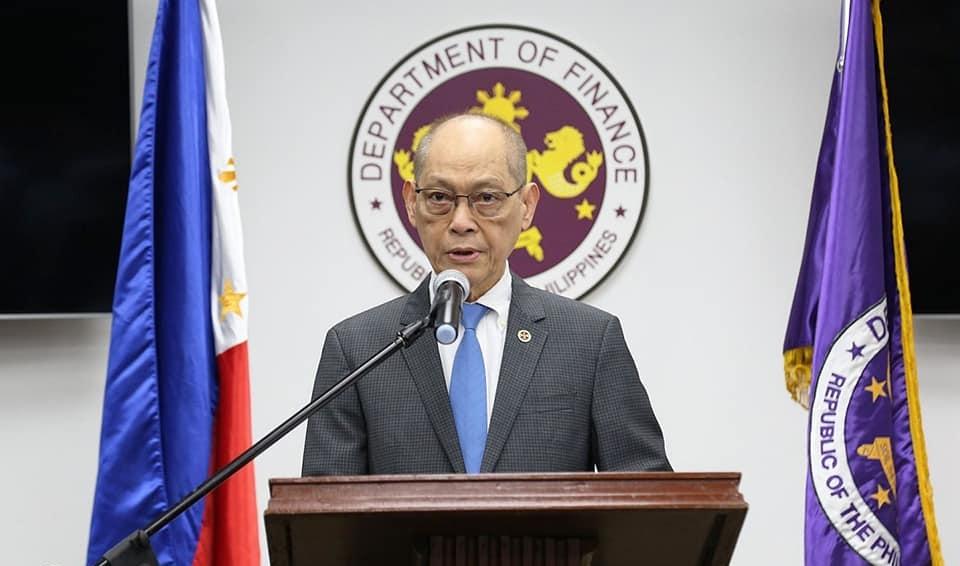Diokno admits economic team not consulted on rice price cap

Finance Secretary Benjamin Diokno, the chief economic manager of President Ferdinand "Bongbong" Marcos Jr., has admitted that the administration’s economic team was not consulted on the implementation of price ceilings on certain rice varieties commonly purchased by households.
During his weekly briefing with the Finance press corps, Diokno recalled that the economic managers—the secretaries of the Finance and Budget departments, as well as the National Economic and Development Authority (NEDA)—were in Japan when the issuance of the Executive Order No. 39 was announced to the public.
The Finance chief said they were “surprised” by the announcement.
“Nasa Japan kami talaga when that was announced. Magkatabi kami ni Arsi. Nagulat nga kami, lumabas. Nagulat siyempre,” Diokno said, referring to NEDA Secretary Arsenio Balisacan.
EO 39, which took effect on September 5, mandates a price cap of P41 per kilo for regular milled rice and P45 per kilo for well-milled rice.
The EO was approved by Marcos upon the recommendation of the Department of Agriculture (DA), which he heads, and the Department of Trade and Industry.
The Finance chief then admitted that “hindi naman nga kami na-consult.”
Nevertheless, Marcos’ chief economic manager defended the President's decision.
Diokno said that Marcos knew that the price cap would not work in an ideal situation, but that it was called for due to rampant hoarding and price manipulation of unscrupulous traders.
“Pagdating namin, ang justification naman ng Presidente, kasi under ideal market condition, hindi talaga magwo-work yung price control. Pero sabi niya hindi naman talaga ideal… kasi may mga hoarding,“ Diokno said.
EO 39 was approved by the President as the retail prices of rice in local markets surged to as high as P70 per kilo.
The order also directed the Philippine Competition Commission (PCC), in coordination with the DA and the DTI, to implement measures against cartels or those abusing their dominant position in the market to ensure fair market competition and uphold consumer welfare and protection.
“The justification is meron mga market players who are misbehaving. Under ideal condition hindi dapat nagpa-price control. Siguro, the conditions are not ideal. Nangyari na ‘yan ‘di ba? Tataas sibuyas, garlic, ngayon kamatis naman so baka kailangan talaga ang ganung measure,” Diokno said.
The Finance chief said that the price cap should be temporary as “it doesn’t work on a long-term.”
“We cannot sustain it,” Diokno said.
"To manage upward pressures on the price of rice, the imposition of price controls on rice through EO No. 39 serves as a short-term measure against non-competitive practices by some market players," he added.
The Finance chief reiterated that price controls, "when carefully calibrated and closely implemented," are effective in the "near-term."
"However, the government recognizes that it also has adverse effects if allowed to linger for a longer period," Diokno said.
Senator Imee Marcos—the president’s older sister—expressed disappointment over the matter, saying his father, late former President Ferdinand Marcos Sr. would rise from his grave and declare martial law because of the problem in the rice industry.
“What sinister forces are at work in the rice industry? First, there was no apparent shortage but suddenly the price of rice skyrockets. To bring price under control, EO 39 is pushed without eco team's knowledge much less assent. Traders, retailers and the entire marketplace is in disarray as warehouses, illegal or not are raided willy- nilly. So of course we now have to lower or remove the import tariff entirely!” Marcos said in a text message to reporters.
“Haven’t we heard this story too many times for us to believe it all again? Wag na tayong magtanim ng palay para matigilan na ang pagdurusa ng magsasakang pilipino- todo import nalang tayo! Babangon at magma martial law ang tatay ko sa ginagawa nila sa bigas ngayong [birthday] pa nya!” she added.
For Senate Deputy Minority Leader Risa Hontiveros, Diokno’s remarks on the EO 39 was “no longer surprising” as it appears that there was a strategic plan to “generate chaos in the industry.”
“The NFA's (National Food Authority’s) announcement of having less than two days of buffer stock, despite having the budget to buy more, along with actions like shutting down alleged hoarders, implementing rice price caps, and providing subsidies to retailers, all appear to have been strategically planned to generate chaos in the industry, dominate the news for an extended period, and get the public ready for more emergency measures,” Hontiveros said in her statement.
“Dahil kung pamumukhaing may ‘emergency’ at ‘rice calamity’, pinapayagan ng Rice Tariffication Law ang government-to-government deal. Sana mali ang akala ko — but such G-to-G deals in the past have been the favored options for people who were seeking to make money out of the deals,” she added.
Marcos had earlier said that the mandatory price ceiling on rice would only be temporary.
The DTI said that it is studying the possibility of lifting the price cap in two to three weeks.
The DA also said that rice and palay prices would stabilize as farmers begin to harvest their main season crop in September and October, a situation that would trigger the lifting of the price control measure.
Last week, Finance Undersecretary Cielo Magno announced that she is leaving the DOF, with Malacañang confirming her termination on Friday.
A reliable source said that this was due to a post on her Facebook account seemingly criticizing the imposition of rice price ceiling. In a statement, the Office of the Executive Secretary claimed that Magno's termination "could only be expected as she clearly does not support the administration and its programs for nation-building." — BM, GMA Integrated News



